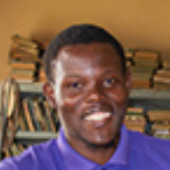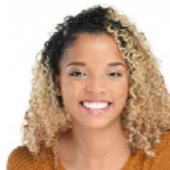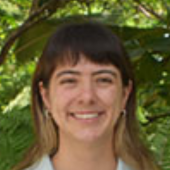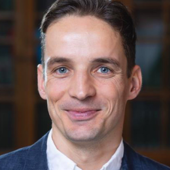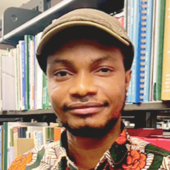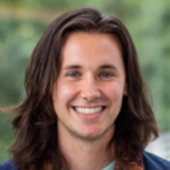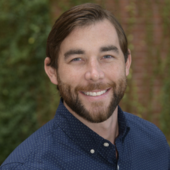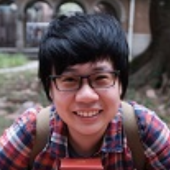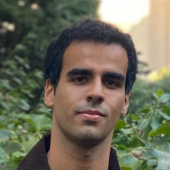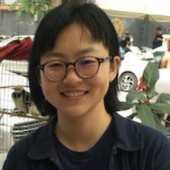Summer Language Training Awardees
The Roberta Buffett Institute’s Summer Language Training Award assists doctoral students in years 1–3 with expenses related to language training necessary for their dissertation research.
2024–25
Semiu Adegbenle
History, Weinberg College of Arts and Sciences
Semiu Adegbenle traveled to Atakpamé, Togo to study Ife-Togo at ACATBLI with the Roberta Buffett Institute’s support. Semiu learned the language to collect oral histories and investigate cultural narratives in Atakpamé and further his research on the sociolinguistic processes shaping the language. Genius Amaraizu
Communication Studies, School of Communication
Genius Amaraizu, through the Roberta Buffett Institute’s support, traveled to various borderland communities across West Africa—namely Katsina, Nigeria and Maradi, Niger Republic—to study Hausa and Yoruba. Genius sought to study the development and deployment of emerging technologies at these borders, exploring how borderland experiences inform migration tech imaginaries and how digital media rhetoric shapes those imaginaries, among other methods of digital ethnographic research. Griffin Berlin
Comparative Literary Studies and Middle East and North African Studies, Weinberg College of Arts and Sciences
Griffin Berlin studied Darija, the North African dialect of Arabic, at the Taa Marbouta Language Center in Tunisia with support from the Roberta Buffett Institute. In studying Darija, Griffin sought to understand the differences in Arabic dialects that intermingle with the French language to undertake research on contemporary Arabic and French North African novels.Chloe Bernadaux
Political Science, Weinberg College of Arts and Sciences
Chloe Bernadaux, with support from the Roberta Buffett Institute, traveled to Cairo, Egypt to learn Colloquial Ammiya, a more widely used language than Arabic in everyday political and social interactions. She studied Ammiya to conduct interviews, engage with local discourse, and interpret narratives surrounding militia integration and business networks as she researches pro-government militias and business elites in governance in the broader Middle East region.Zhiqing Chen
History, Weinberg College of Arts and Sciences
Zhiqing Chen, with the Roberta Buffett Institute’s support, traveled to Jakarta, Indonesia to study Indonesian to read colonial archives and study how diasporic Chinese communities shaped medicinal and food culture in colonial Southeast Asia under the influences of government, ethnic relations, and labor regimes.Ca'la Connors
Anthropology, Weinberg College of Arts and Sciences
Ca’la Connors, with the Roberta Buffett Institute’s support, traveled to Douala, Cameroon to study at the Visocare Linguistic Academy and immerse herself in Cameroonian Pidgin, or Kamtok. With her project rooted in critical biocultural anthropology, Ca’la is practicing ethnographic methods, such as participant interviews and observation, to collect data on how Anglophone women experience and negotiate the realities of pregnancy as a socially, politically, and linguistically marginalized population.Adriaan Denbroeder
History, Weinberg College of Arts and Sciences
Adriaan Denbroeder, with support from the Roberta Buffett Institute, enrolled in the International Chinese Language Program at National Taiwan University in Taipei, where she learned to read and translate classical and modern Chinese texts. With her new language skills, she aims to further her understanding of the history of public goods provision and the patterns of water use and allocation in China during the 19th and 20th centuries. Mariana Charry Esguerra
History, Weinberg College of Arts and Sciences
With support from the Roberta Buffett Institute, Mariana Charry Esguerra traveled to Andahuaylas, Peru to study Quechua at the Jose Maria Arguedas National University. She learned Quechua to read primary sources that illuminate how colonial authorities envisioned conversion, governance, and settlement beyond the Andes to further her research on how musical practices shaped Indigenous sovereignty in the Bolivian Amazon. Matej Jungwirth
Political Science, Weinberg College of Arts and Sciences
Matej Jungwirth, with support from the Roberta Buffett Institute, conducted a six-month intensive study of Finnish online through The Scandinavian House to further his research on “territorial mourning,” which contextualizes Finland’s loss of the Karelian region to the Soviet Union in World War II in the persisting Finnish-Soviet contestation, bringing the conflict to the forefront in American social sciences for non-Finns to research.Shamini Kothari
Comparative Literary Studies, Weinberg College of Arts and Sciences
Shamini Kothari, with the Roberta Buffett Institute’s support, traveled to Pune, India to immerse herself in the Marathi language. Shamini learned Marathi to map out the politics of respectability that reflect gender, sexuality, and caste norms in Maharashtra and Gujarat, a neighboring state on which Maharashtra has exerted vast influence across literary and political exchanges.Eli Kuto
Anthropology, Weinberg College of Arts and Sciences
Eli Kuto traveled to the Nakpanduri and Tusuk communities in Ghana, with the Roberta Buffett Institute’s support, to study the Moar language. Through studying Moar, Eli sought to access primary sources such as oral histories and traditions that more effectively communicate cultural beliefs, values, and practices. His research focuses on Indigenous peoples’ concepts of food security and vulnerability and aims to construct a new knowledge framework through which to understand culturally elastic definitions of community relationships to food and the environment.Junwoo Lee
History, Weinberg College of Arts and Sciences
Junwoo Lee traveled to Vietnam to study North-South dialects of Vietnamese with the Roberta Buffett Institute’s support. Junwoo learned Vietnamese to analyze newspapers, propaganda documents, and other writing from the Cold War era. He also seeks to gather oral accounts of the period to build context for his examination of how non-state actors constructed financial markets throughout the decolonizing world of the time. Noah Marcus
Theatre, School of Communication
With support from the Roberta Buffett Institute, Noah Marcus participated in the YIVO Institute for Jewish Research’s online program for Yiddish study to advance his research on Jewish theatrical representations in Canada and the US from 1880 to 1930. Noah learned Yiddish to survey archival media from the time—including scripts, newspapers, letters, and advertisements—to uncover specific performance approaches which Jewish performers took to convey a sense of Jewishness in their work. Ryan Marr
History, Weinberg College of Arts and Sciences
With support from the Roberta Buffett Institute, Ryan Marr completed an online program to learn Fon, the most spoken language in southern Benin. Ryan learned Fon to study vodun, a tradition of ritual practices indigenous to the region, and its evolutions across Atlantic traditions during the slave trade. Kate Rhoda Nkrumah
Comparative Literary Studies, Weinberg College of Arts and Sciences
Kate Rhoda Nkrumah, through the Roberta Buffett Institute’s support, studied Hausa at Kaduna State University in Kaduna State, Nigeria to further her research on West African Muslim women’s intellectual and literary contributions, particularly nineteenth-century scholar and poet Nana Asma’u. She aimed to explore the original writings of Asma’u’s intellectual legacy as it influenced West Africa and surveys Islamic pedagogy and discourse in Christian majority contexts. Ifeayin Eziamaka Ogbuli
History, Weinberg College of Arts and Sciences
Ifeayin Eziamaka Ogbuli, with support from the Roberta Buffett Institute, enrolled in Nnamdi Azikiwe University in Awka, Nigeria to study southeastern Nigeria’s major language of Igbo. Ifeayin seeks to construct the history of the murder of a young slave girl at the hands of a Christian couple setting up a mission station in Onitsha, Nigeria in the nineteenth century.Thomas Parsa
History, Weinberg College of Arts and Sciences
Thomas Parsa, with support from the Roberta Buffett Institute, completed three programs for the study of Uzbek: two virtual courses offered by the University of Wisconsin-Madison and Indiana University Bloomington, and a hybrid language course offered by Arizona State University’s Critical Language Institute, through which Thomas traveled to Uzbekistan. Thomas learned Uzbek to read and analyze sources in Chagatai, an extinct language descended from Uzbek that was used by Persian scholars.Cara Snajczuk
Religious Studies, Weinberg College of Arts and Sciences
Cara Snajczuk traveled to Kathmandu, Nepal with support from the Roberta Buffett Institute to develop fluency in Colloquial Tibetan to study traditional hermeneutics with Tibetan and Himalayan scholars. Through her fieldwork in Tibetan Buddhist communities, she developed sensitivity to the nuances of the language, ranging from sound to poetic devices, and explored how certain textual and ritual practices have shaped and continue to shape religious communities. Rina Talaba
Plant Biology and Conservation, Weinberg College of Arts and Sciences
Rina Talaba traveled to Taguig, Philippines to study Tagalog and Bisaya at the Eriza’s Language School with support from the Roberta Buffett Institute. Rina sought to elevate their proficiency in Tagalog and Bisaya to work with the National History Museum of the Philippines on genetic analysis and conservation research of the endangered species of the Philippines’ endemic Artocarpus plants. Rebecca Turner
Theatre and Drama, School of Communication
Rebecca Turner, with the Roberta Buffett Institute’s support, traveled to Tel Aviv, Israel to complete the Naomi Prawer Kadar International Summer Yiddish Program at Tel Aviv University. Rebecca learned Yiddish to expand her research on women playwrights’ contributions to Yiddish popular theater, undertake a hands-on workshop with professional actor Mikhl Yashinsky, and help develop the DYBBUK Project with scholar Miriam Trinh.Aviva Waldman
English, Weinberg College of Arts and Sciences
Aviva Waldman studied Yiddish at the Yivo Institute for Jewish Research in New York City with the Roberta Buffett Institute’s support. Aviva’s studies focused on analyzing the arc of American Jewish literature in the twentieth century, positioning Yiddish fiction and press of the time in the context of global affairs as Yiddish-speaking communities around the world understood them. Umar Yandaki
History, Weinberg College of Arts and Sciences
Umar Yandaki traveled to Northern Nigeria to study Ajami under Professor Salisu Bala at Ahmadu Bello University with support from the Roberta Buffett Institute. Umar learned Ajami to conduct research on urban landscapes and built environments in the region, examining city walls and gates as nodes of power and regulatory structures for global commerce, ideas, and politics between the 15th and 20th centuries.2023–24
Aseel Abulhab
Anthropology, Weinberg College of Arts and Sciences
With the Roberta Buffett Institute’s support, Aseel Abulhab studied Arabic Sign Language (ArSL) at the Pomegranate Institute in Dubai, United Arab Emirates. As a native Arabic speaker, Aseel seeks to use ArSL to build stronger connections with d/Deaf Middle Eastern immigrants and refugees to gather data on dual language acquisition education. Xena Amro
Comparative Literary Studies, Weinberg College of Arts and Sciences
Xena Amro, with the Buffett Institute’s support, traveled to Beirut, Lebanon to study Arabic at the American University of Beirut. Xena’s research centers on Arabic manuscript culture, which offers insights into the intellectual, cultural, and religious traditions of the Islamic world, and the thoughts and practices of past scholars and communities. Xena learned Arabic to examine these documents in their original form, uncovering the layers of meaning, textual variation, and historical context embedded within them.Alison Choi
History, Weinberg College of Arts and Sciences
With support from the Roberta Buffett Institute, Alison Choi traveled to Seoul, South Korea to complete the Sogang Korean Immersion Program at the Korean Language Education Center. Alison was fully immersed in Korean for four weeks, attending classes teaching grammar, communication, reading, and culture and participating in activities and field trips to broaden the contexts in which Korean is understood. Matthew Drew
Religious Studies, Weinberg College of Arts and Sciences
With the Roberta Buffett Institute’s support, Matthew Drew completed an Advanced Colloquial Tibetan class at the Rangjung Yeshe Institute in Kathmandu, Nepal. He elevated his proficiency in Tibetan to interview Tibetan monks about ritual practices in specific monasteries and read the thirteenth Dalai Lama’s biography. His research focuses on how the thirteenth Dalai Lama attempted to use Buddhist ritual, monastic communities, nationalism, and relationships with local land spirits to create a Tibetan community to stave off colonial threats in the 20th century. Olugbenga Joseph
Sociology, Weinberg College of Arts and Sciences
With support from the Roberta Buffett Institute, Olugbenga Joseph traveled to the University of Ibadan in Ibadan, Nigeria to study Yoruba. Olugbenga learned Yoruba to gather ethnographic data on the experiences of college students in Nigeria for his research on the settings, methods, and motives for friendship formation in Nigerian and US universities.Hae Uk Ko
History, Weinberg College of Arts and Sciences
Hae Uk Ko traveled to Goyang, South Korea to study Hanmun with support from the Roberta Buffett Institute. Hanmun was East Asia’s bridge language for over two millennia, becoming the language of the elite in Korea up until the mid-twentieth century. Hae learned Hanmun for their research on “othering” in Korea, enabling first-hand investigation of formal documents ranging from government reports on international adoption of mixed-race babies to court rulings on disability laws.Keegan Krause
Anthropology, Weinberg College of Arts and Sciences
Keegan Krause, with support from the Roberta Buffett Institute, traveled to the Dominican Republic to study Haitian Kreyol. Keegan learned the language to conduct interviews for his research on the relationship between social belonging, violence, and health among Haitian immigrants and Dominican nationals.Meng-rung Lin
Anthropology, Weinberg College of Arts and Sciences
Meng-rung Lin, with the Roberta Buffett Institute’s support, traveled to National Taiwan Normal University in Taipei, Taiwan to study Taiwanese. He learned the language to collect ethnographic data for his research on how energy shapes communities during Taiwan’s transition period.Soumya Shailendra
Comparative Literary Studies, Weinberg College of Arts and Sciences
Soumya Shailendra traveled to Kerala, India to study Malayalam and its regional dialects with support from the Roberta Buffett Institute. Her research explores how Dalit writers, or writers from marginalized caste groups, articulate an alternate political identity for themselves by experimenting with normative conventions of literary form and genre. She learned Malayalam to access relevant primary texts from Kerala and interact with local libraries and activist organizations.Angad Singh
English, Weinberg College of Arts and Sciences
Angad Singh traveled to New Delhi, India with the Roberta Buffett Institute’s support to expand his knowledge of Gurmukhi and Shahmukhi, the primary scripts of the Punjabi language. Angad’s work engages with many Punjabi documents written in both Gurmukhi and Shahmukhi, from administrative and legal records to folktales and photobooks, helping him construct a history of the gender and sexuality of the South Asian region of Punjab.Weiliang Song
History, Weinberg College of Arts and Sciences
With the Roberta Buffett Institute’s support, Weiliang Song traveled to Paris, France to study French and Cham. Weiliang’s preliminary research using Vietnamese and Chinese documentation suggests a history of the undoing of the territory of Champa, which is now in Vietnam, involving French missionaries. Weiliang sought to develop a thorough understanding of French and Cham, the primary language of Champa, to access French and Cham archives in Paris and to engage with scholars in seminars and conferences.